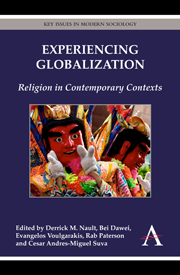Book contents
- Frontmatter
- Contents
- Preface
- Chapter 1 Introduction
- Part One Religion in Global and Transcultural Perspective
- Part Two Comparative and Pluralistic Approaches
- Chapter 5 Mary, Athena and Guanyin: What the Church, the Demos and the Sangha Can Teach Us about Religious Pluralism and Doctrinal Conformity to Socio-cultural Standards
- Chapter 6 The Globalization of the New Spirituality and its Expression in Japan: The Case of Mt Ikoma
- Chapter 7 Globalization and Religious Resurgence: A Comparative Study of Bahrain and Poland
- Part Three Religion in Taiwan
- List of Contributors
Chapter 5 - Mary, Athena and Guanyin: What the Church, the Demos and the Sangha Can Teach Us about Religious Pluralism and Doctrinal Conformity to Socio-cultural Standards
from Part Two - Comparative and Pluralistic Approaches
Published online by Cambridge University Press: 05 May 2013
- Frontmatter
- Contents
- Preface
- Chapter 1 Introduction
- Part One Religion in Global and Transcultural Perspective
- Part Two Comparative and Pluralistic Approaches
- Chapter 5 Mary, Athena and Guanyin: What the Church, the Demos and the Sangha Can Teach Us about Religious Pluralism and Doctrinal Conformity to Socio-cultural Standards
- Chapter 6 The Globalization of the New Spirituality and its Expression in Japan: The Case of Mt Ikoma
- Chapter 7 Globalization and Religious Resurgence: A Comparative Study of Bahrain and Poland
- Part Three Religion in Taiwan
- List of Contributors
Summary
Introduction
Globalization is a process through which technological advancement, cultural exchange, media networks, trade and educational initiatives lead to awareness of and interaction with different ethnic, religious and social groups (whether domestically or across international borders). However, group-identification and exclusivity continue to prevail in mission-oriented religions (e.g., Christianity, Islam, Buddhism), as well as ethno-religious identity groups (e.g., Judaism). While doctrine is often reinterpreted in conformity with changing social expectations, this process is rarely if ever acknowledged by the religious groups and innovators in question, who more typically lay claim to the rediscovery, reinstitution and reestablishment of originally intended truths. This suggests the inevitable influence of exclusivism (soteriological or membership-related), noble origins and group identification. Religious pluralism—in the sense of active engagement with and understanding of otherness without loss of distinctiveness for the purpose of realizing our own multiplicity of origins (Eck 2002)—is incompatible with such approaches, yet consistently “confused” (sometimes sincerely) with mere tolerance and interfaith dialogue for the purpose of projecting a positive public image. For example, the Dalai Lama has stated, on the one hand, that it is better for most people to remain devoted to their own religions than to convert to Buddhism. On the other hand, he has also claimed that there is one, and only one, way to reach enlightenment, namely the Prasangika Madhyamika tenet system. Although there may be many ways of reaching that final stage, from there on it is Prasangika Madhyamika or nothing (Dalai Lama 2001; cf. Revel and Ricard 1998).
- Type
- Chapter
- Information
- Experiencing GlobalizationReligion in Contemporary Contexts, pp. 81 - 108Publisher: Anthem PressPrint publication year: 2013



